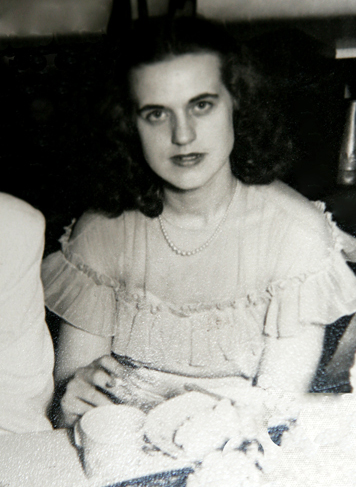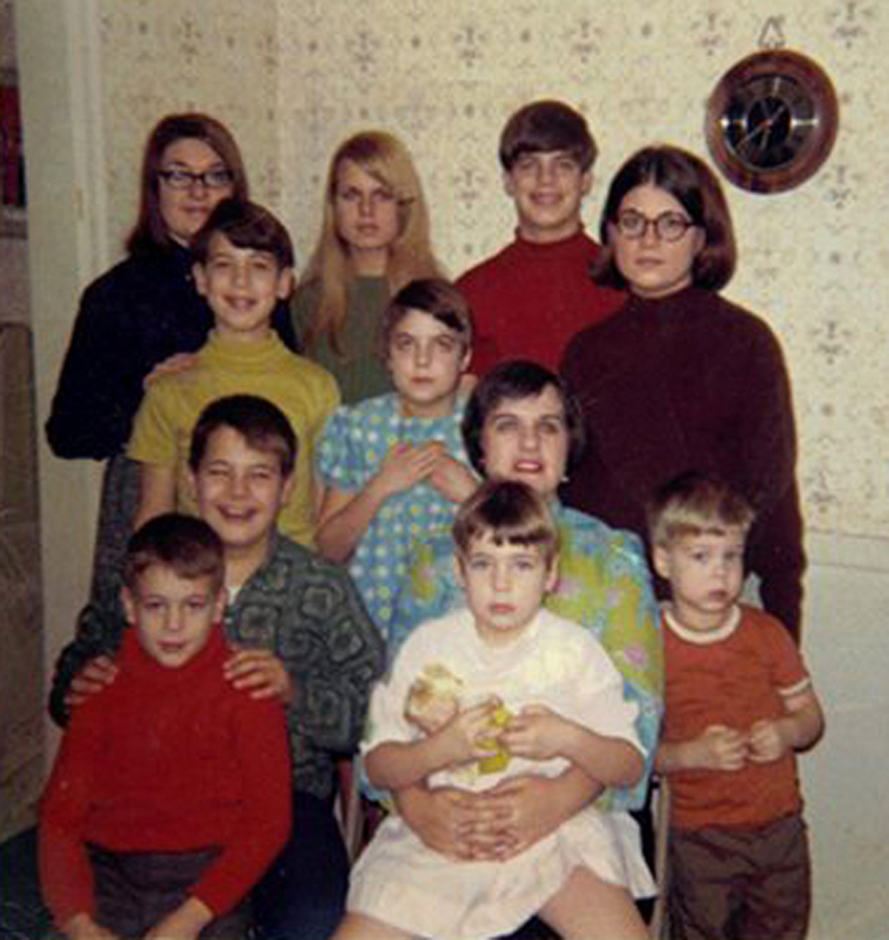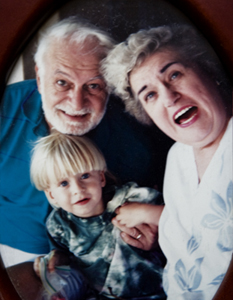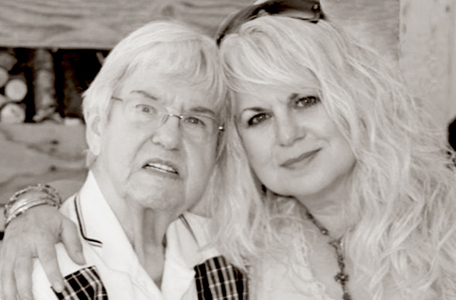She's tucked in her lift chair, chilled and uneasy, waiting for the tea and dry toast to work their magic. With raised eyebrow and a sardonic grin she says, "It ain't easy gettin' old..." She's tired, though she's been in bed since breakfast; it's a long day by 2 p.m. and not  necessarily a good one. There are good ones, though, ones in which she plays cards with other tenants, joins the sing-alongs, exercises from her chair and gets to Mass. She enjoys a good movie and relishes her three squares. She uses a walker consistently now but still listens to rock and roll and finds it astonishing that I'm the age I am (as do I!). She is 81, a widow for over 11 years and a diagnosed dementia patient for the last two. She is my mother.
necessarily a good one. There are good ones, though, ones in which she plays cards with other tenants, joins the sing-alongs, exercises from her chair and gets to Mass. She enjoys a good movie and relishes her three squares. She uses a walker consistently now but still listens to rock and roll and finds it astonishing that I'm the age I am (as do I!). She is 81, a widow for over 11 years and a diagnosed dementia patient for the last two. She is my mother.
I left home -- and her -- a long time ago. I left hard and fast and with blind conviction. There was no quibbling, no waffling, no weepy boomeranging. After too much family and just enough college, I left the state of Illinois never to come back, except for short visits and eager departures. My mother referred to this as "when Lorrie ran away." For me it was the Necessary Freedom Tour.
I am the third child, the third girl, in a family of 11 children. My two older sisters and I, by virtue of gender and placement in the family, became Little Mommies, caring for smaller, younger siblings while we were still smaller, younger siblings ourselves. Although the responsibility and high-task demand did lend a certain skill set that proved useful in later life, helping your mother run a household as well as being truly "in charge" of an infant brother when you are 6 years old is perhaps too steep a learning curve. I learned how to change diapers, feed babies, wrangle toddlers, do laundry, make meals, iron a business shirt, clean a house and run interference for a mercurial, often erratic, always confounding mother -- and that was all before I got to high school.
By the time I did get to high school I was bone-weary of family life and chomping at the bit so hard my teeth hurt. College and its independence couldn't come fast enough. It wasn't just the weight of trading too much childhood for Little Mommy-hood or the chafing felt at my parents' religious and social worldview, it was that I could not find an honest way to consistently and compassionately tolerate my mother.
She was a true paradox. One minute clever and creative, the next enraged and irrational. She was impossible to predict and easy to trigger. She loved passionately and could make any day a party. She played music, did a mean jitterbug and had a wildly romantic relationship with  the handsome man who was my father. All of those things provided The Good that pushed against The Other. The Other was her dark side; those terrifying moments of fury followed by weeping or cold silence. Rages that shook the house and scattered us all like terrified animals. As a child, I would literally tremble at the sound of her stomping down the stairs to mete out some punishment for failings I could never seem to avoid. She was physical and vocal and unrelenting, and when the controls snapped and life got the best of her, we all suffered. And life got the best of her too often. She had a warm, good heart, and no one loved their kids more than she, and she tried -- I believe she sincerely tried -- but she was undeniably overwhelmed.
the handsome man who was my father. All of those things provided The Good that pushed against The Other. The Other was her dark side; those terrifying moments of fury followed by weeping or cold silence. Rages that shook the house and scattered us all like terrified animals. As a child, I would literally tremble at the sound of her stomping down the stairs to mete out some punishment for failings I could never seem to avoid. She was physical and vocal and unrelenting, and when the controls snapped and life got the best of her, we all suffered. And life got the best of her too often. She had a warm, good heart, and no one loved their kids more than she, and she tried -- I believe she sincerely tried -- but she was undeniably overwhelmed.
So I left, I stayed away and managed to keep her away for longer than you'd expect. But life and the act of living offers many a surprise and without even trying, it changes you. You grow older and experience more, and you begin see how difficult it can be when expectations are not met or you feel the sharp, stinging pang of disappointment and heartache. You look around and realize that not all dreams come true and the promise of what fate seemed to offer is not always within reach. Life humbles and sometimes softens you. And you can't help but evolve as a result. And it wasn't until I got married and had my own child that I began to see my mother outside the childhood box I'd kept her in for most of my life. When I attached to my own child I began to have some inkling of what she went through, many times over, in her own role as a mother, particularly a mother who grew up without one herself.
And I began to have empathy.
Many people I know, most of them women, are caring for or have cared for their aging or  dying parents. It seems a rite of passage for women in mid-life. It's a task like no other and requires a certain kind of heart and an enormous depth of soul -- heart and soul I had never felt for my mother and wasn't sure I could muster. But 10 years after my father died, my aging, rudderless mother was lost and in need. Her short-term memory was diminishing more every day, she was often sick and in pain, incapable of caring for herself responsibly, and my siblings had run out of people and places to care for her in the ways she needed. I had to assess: I looked at my life, my capacity for change. I looked to my dear brother who lives in the same city as I, looked to my husband, my sister-in-law, my son, and I could see, clear as the day I left home, that I had to step up and take it on. To participate. To get my mother to a place she could once again call home.
dying parents. It seems a rite of passage for women in mid-life. It's a task like no other and requires a certain kind of heart and an enormous depth of soul -- heart and soul I had never felt for my mother and wasn't sure I could muster. But 10 years after my father died, my aging, rudderless mother was lost and in need. Her short-term memory was diminishing more every day, she was often sick and in pain, incapable of caring for herself responsibly, and my siblings had run out of people and places to care for her in the ways she needed. I had to assess: I looked at my life, my capacity for change. I looked to my dear brother who lives in the same city as I, looked to my husband, my sister-in-law, my son, and I could see, clear as the day I left home, that I had to step up and take it on. To participate. To get my mother to a place she could once again call home.
But a voice kept interrupting those admirable thoughts to say, "Oh, come on... not you! You don't have to do it! You left her a long time ago for damn good reason and it's not your job. You have your own life!" Blah, blah, blah. Damn, that voice was loud.
But I could feel it. It was my job. It was my turn. It seems a louder voice had crept into the conversation, and it was making some sense. It assured me that I could do it, I knew what she needed and... I did. I found a place that would be a sanctuary for her, perhaps for the rest of her life, and in the blink of an eye it seems I was in. No turning back, no quibbling, no waffling, no lack of conviction. I was bringing my mother to live in my town, and with my brilliant and indispensable brother, his family and my own, I was going to participate in the local care and feeding of the woman I so long ago had fled.
And some days I suck at this job. I wake up and feel my teeth grinding, resentful that I have to leave yet another unreturned message with her doctor or rifle through reams of insurance paperwork. I don't want to drive over to her facility to have the same conversation over and over or play that infernal card game she loves so much. I sometimes feel real anger when it seems I'm just expected to schedule my life around her myriad of doctor appointments or give up time with my family to get her over to Target for items she's lost or broken. I shudder when I see the name of the facility on my caller ID, waiting to hear she's been taken to the hospital or she's having a hissy fit because she's convinced they didn't administer her meds. Sometimes I feel, once again, like a Little Mommy, only this time the child I'm caring for is my Mother. The irony is inescapable.
But there's another side to this. The growing awareness of some sprouting evolution. In her case, the dementia that is creeping more and more into her personality has done a curious thing: it seems to have stripped away her anger and narcissism. It seems to have pared her down to a purer essence of herself, a human being who can be grateful and appreciative. Who can smile even when she's nauseous and tell me how happy it makes her just to see me across the room. A woman who can be gentle and attentive to her new great-granddaughter and patiently (if reluctantly) teach a more challenged housemate how to play her card game. A woman who can genuinely thank a son for a dinner out or a daughter-in-law for doing her laundry every week; who can be delighted by a grandson who makes her laugh or another who brings in a crew of fellow students to interview her for a class. Who can listen and take note of the person in front of her. This is different woman, a different mother. And this different mother is allowing me to be a different daughter.
And so we seem to be on the Mutual Reinvention Tour. I'm learning patience; she's learning humility. She looked up at me recently and said, "I'm scared." When I asked why, she said, "Because I've made so many mistakes, especially with you kids," concerned that at the Gates of Heaven she will be judged harshly. But mostly she wanted me to know that she loved us all and was sorry for those mistakes. I felt a tug. I took her hand and said, "It's OK, Mom, you've already been forgiven." And as I said that, I realized that, like St. Peter at the Gates and God in the Heavens, I, her third daughter, her runaway, her lost child, had forgiven her as well. And in that swirling eddy of emotions, sweet and simple love could be found. Precious and timely as the Tour continues...

All photos courtesy of Lorraine Devon Wilke